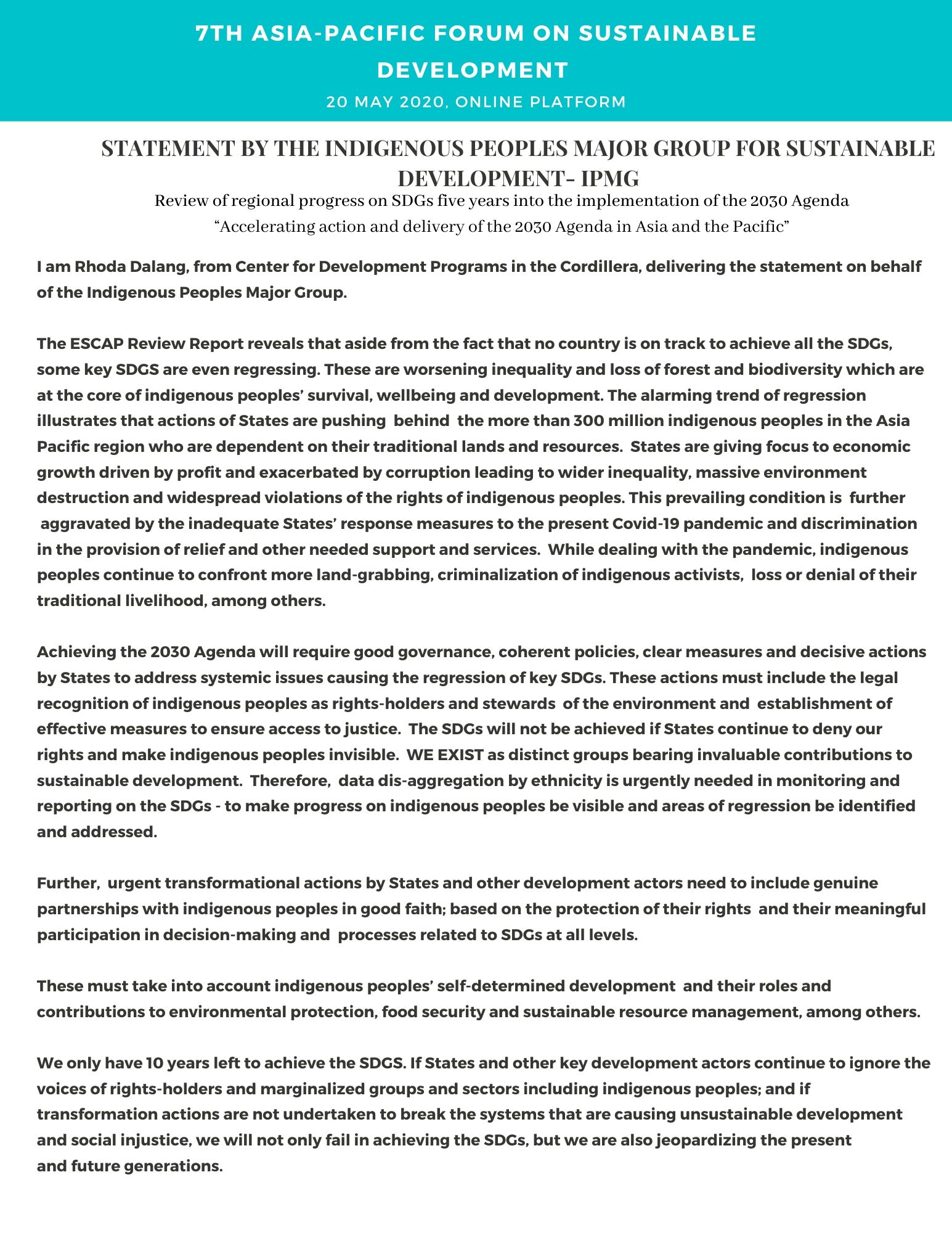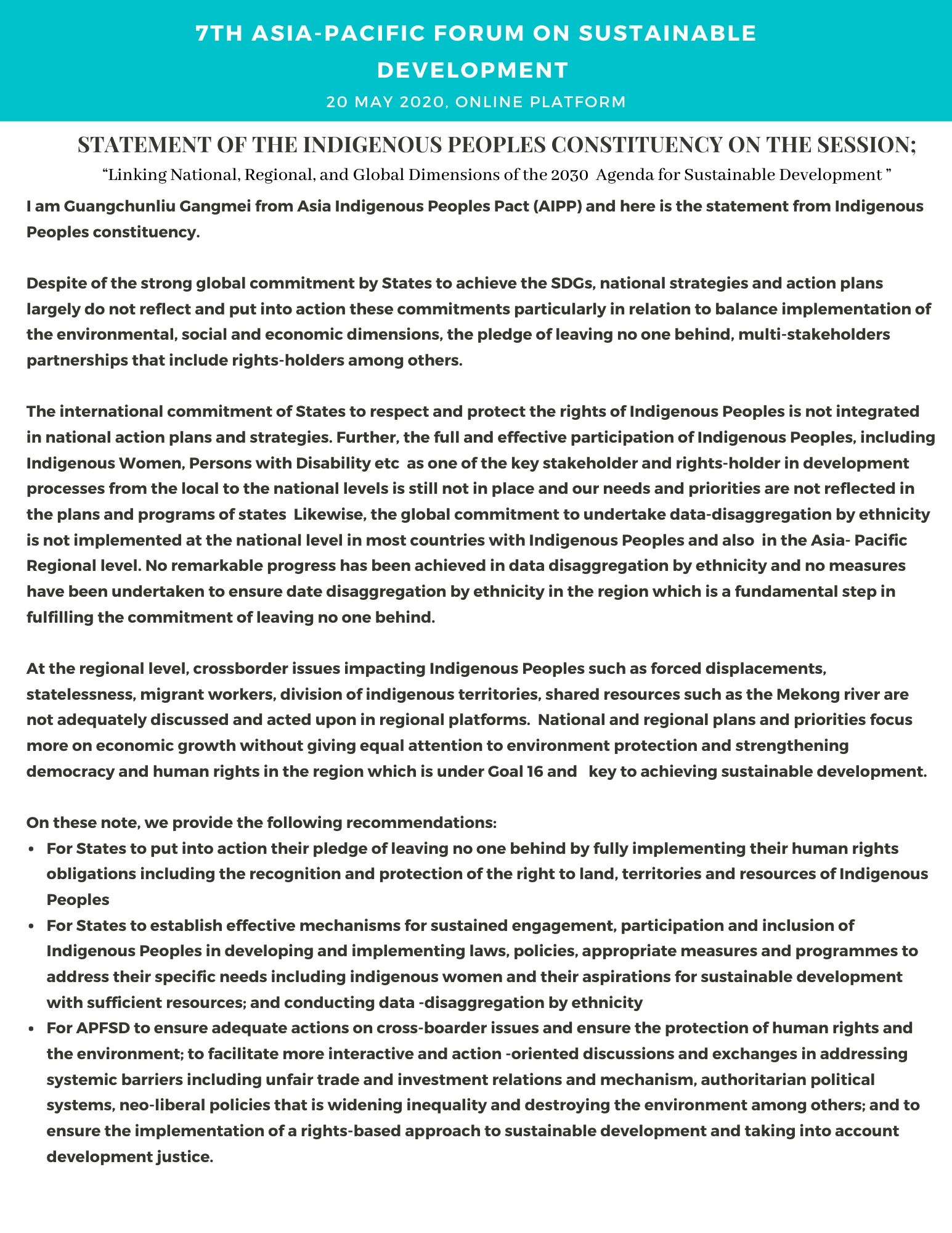The Center for Development Programs in the Cordillera (CDPC) participated in the 7th Asia Pacific Forum on Sustainable Development (APSFD) under the coordination of the Asia Pacific Regional CSO Engagement Mechanism (APRCEM). The APRCEM is a civil society platform aimed to enable stronger cross constituency coordination among CSOs in the sub-regions of Asia Pacific, ensuring that their voices are heard in intergovernmental processes in regional and global level (Asia Pacific Regional CSO Engagement Mechanism, 2020).
The Asia-Pacific Forum on Sustainable Development (APFSD) is an annual and inclusive intergovernmental forum that provides a regional perspective on the implementation of the 2030 Agenda for Sustainable Development. It is a platform for governments, civil society, private sector, and other stakeholders to identify regional trends and make recommendations in support of countries lagging behind the achievement of the Agenda for Sustainable Development 2030 (UNESCAP, 2020) . The United Nations Economic and Social Commission for Asia and the Pacific (ESCAP) was supposed to convene the 7th APFSD in Bangkok on 25-27 March 2020. But due to the coronavirus (COVID-19) pandemic, it was held on May 20, 2020 as a fully virtual event.
With the theme “Accelerating action for and delivery of the 2030 Agenda in Asia and the Pacific”, the forum provided regional trends on progress and regress and comparison across sub-regions and countries.
Good progress was noted in regards to the institutionalization of the 2030 Agenda for Sustainable Development across Asia and Pacific. Among of which are a better understanding of data needs, mapping of governments’ strategic action plans, the leveraging of public-private partnerships, prioritization and localization of the goal. It includes strengthening of capabilities of institutions to work on integrated solutions coupled with the recognition of the importance of involving businesses, civil society and science institution in the 2030 Agenda implementation. But on the other hand, regress was noted to goals related to the environment due to continuing systemic barriers, including in relation to the precariousness of livelihoods, low levels of social protection, and the impacts of discrimination and inequalities on access to social services. Gender equality is reported to have a very slow progress. Moreover, concerns around data, inter-agency coordination, institutional capacity, governance systems, service quality, rates of military spending, violence and extremism still persists. Lack of transparency and participation restricts public scrutiny of policies and finances and undermines good governance. Regression with the goal to reduced inequalities is also noted. Herein, marginalized and excluded groups continue to be affected by financial constraints and recurring spending cuts. Widening inequality is still a significant concern due to the perpetuation of the misuse of public funds and inequitable allocation of resources (ESCAP, 2020:4).
The 7th APFSD is similarly an avenue for the different CSO stakeholders to present their views including strategies to address gaps in the delivery of 2030 Sustainable Development Goals. However, many CSO representatives were unable to state their intervention messages due to technical glitches and priority given to government representatives. Mr. Jeffry Acaba, People Living with HIV representative stated during his intervention that “on behalf of the APRCEM and the CSOs who have connected online to participate in this forum,we would like to reiterate our disappointment as CSOs that regardless of which platform to use, virtual or physical, CSOs voice and perspectives are being push towards the end of the line. At the time when those in the last mile should be put first. [..] The final report must take note of this technological set-up of the 7th APFSD and present clearly the challenges that we have faced. We also hope that in the succeeding APFSD, CSOs voice and interventions must be included in all agenda item.”
Both interveners from the Indigenous Peoples Major Group were among the CSO speakers unable to deliver their interventions in behalf of the Indigenous Peoples constituency. Ms. Rhoda Dalang, executive director of the Center for Development Programs in the Cordillera was supposed to underscore the report of the ESCAP that no country is on track of achieving the SDG and in fact, the agenda on inequality and biodiversity are regressing, issues which are at the core of indigenous peoples’ survival, well-being and development. Another speaker also unable to speak was Guangchunliu Gangmei from Asia Indigenous Peoples Pact (AIPP) who was to present the recommendation to States to put into action their pledge of leaving no one behind by fully implementing their human rights obligations including the recognition and protection of the right to land, territories and resources of Indigenous Peoples. Below are the statements by the Indigenous Peoples Major Group For Sustainable Development.
The result of the forum will be presented in the upcoming High-level political forum on sustainable development (HLPF) to be conducted on July 2020. ~Charmagne Rimando, CDPC Staff


References cited:
Asia Pacific Regional CSO Engagement Mechanism. (2020). APRCEM Background. <http://asiapacificrcem.org/about-rcem/what-is-the-rcem/>.
ESCAP. (2020). Seventh Asia-Pacific Forum on Sustainable Development Draft Report. <https://www.unescap.org/apfsd/7/document/APFSD7_L2E_Rev1.pdf>.
United Nations ESCAP. (2020). About APFSD. <https://www.unescap.org/apfsd/7/document/Major-groups-and-stakeholders/Indigenous %20Peoples’%20(proposed%20StatementAgenda%20item%202).pdf>.
